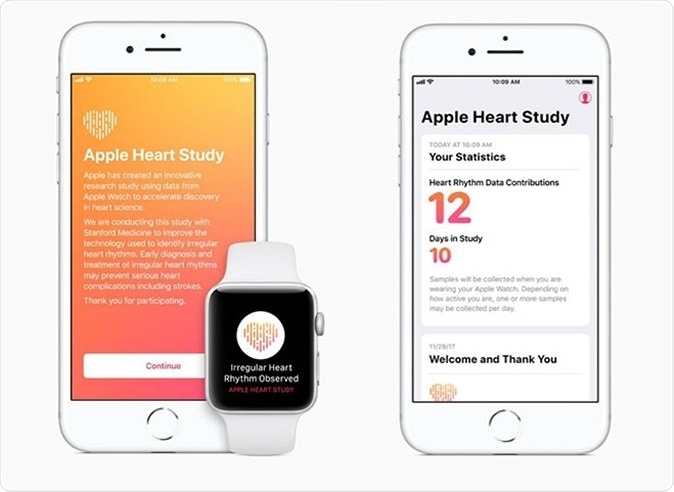A new study has shown that the latest Apple Watch is capable of detecting irregular heartbeats in the user. This is a significant step towards wearable healthcare devices says Apple.

Examples of the notifications that participants in the Apple Heart Study receive. Courtesy of Apple
The study sponsored by Apple looked at 419,297 Apple Watch users. The recordings of the watch could help screen the users for a particular type of irregular heartbeats called atrial fibrillation. Among the wearers of the watch, 2100 participants were warned by the watch about having an irregular heartbeat. The team of researchers then included these participants for a detailed ECG study to actually understand their arrhythmias. Around a third of these (34 percent) participants were finally diagnosed with atrial fibrillation says the study.
The Apple watch uses an optical sensor to analyse the pulse data. When it senses a variability of heart rate over a 48 hour period, it sends a warning to the user about irregular heart rate. The wearer can also push a button to take an ECG and share the readings with the physician. This feature was not analysed in this present study.
The team of researchers presented the study results at the Annual Scientific Session and Expo by the American College of Cardiology in New Orleans. Apple is the first to provide ECG services in its Apple Watch Series 4 which has been on the market since last year. Doctors however are not sure if users should rely entirely upon these devices. They advise users to consult their doctors before taking any further course of action. Some experts are worried about the deluge of false positives that may present to the GPs as a result of these devices.
Stanford University’s Dr Marco Perez, lead author of the study said, “The physician can use the information from the study, combine it with their assessment.... And then guide clinical decisions around what to do with an alert.” Dr. Mintu Turakhia Stanford lead researcher explained that atrial fibrillation may come and go and many cases may be missed if not continually monitored. Lloyd Minor, dean of Stanford’s medical school added, “The findings are exciting and encouraging, but clearly there is a lot more to be done.” Apple looks forward “to learning more about the impact of Apple Watch alongside the medical community,” said Jeff Williams, the company’s chief operating officer.